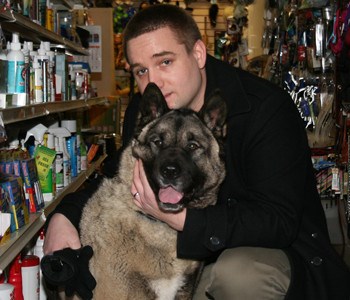Cooper Rybak’s dogs were healthy and happy creatures, or so it seemed.
But both developed oral cancer and later succumbed to the disease. For years he couldn’t understand why. Now a fourth-year nursing student at Lakehead University, the likely reason dawned on him when he went to work as a tobacco cessation intern with the Thunder Bay District Health Unit.
Ryabak’s father was a smoker, and he’s convinced that the habit led to them contracting the deadly disease.
"I’ve become much more aware of the harm second-hand smoke can cause, not only to humans, but to our pets as well," Rybak said on Tuesday, at the launch of a TBDHU-sponsored campaign asking smokers to step outside when lighting up, in consideration of the animals around them.
"This new knowledge leaves me wondering if the constant exposure to second-hand smoke is what eventually caused our dogs’ deaths. It is my hope by sharing this story and educating smokers about the dangers second-hand smoke can have on their pet’s health, that it will motivate people to quit smoking, or at least take the smoke outside."
According to the health unit, there are more than 4,000 chemical compounds in second-hand smoke alone, more than 50 of which are known cancer causers. Second-hand smoke has been linked to lymphoma in cats, lung and nasal cancers in dogs and lung cancers in birds.
"There’s a lot of oral and nasal cancer, especially with dogs. They are forever sniffing things that are close to the ground, the furniture that sort of thing. They’re sniffing up the third-hand smoke, the chemical residue that lingers behind," Trevisan said, noting it also sticks to fur, which pets tend to ingest while grooming.
While these three types of pets are the focus of the Pets and Second-hand Smoke campaign, all animals in smoke-filled houses are potentially at risk, said Susan Trevisan, smoking cessation co-ordinator at TBDHU.
Lynn Herman, owner of the Pet Shack, said it’s nice to see the issue finally being addressed, noting a hefty increase in animal cancers.
"Years ago you never saw cancer in pets. Now you see it quite often. We look at how it affects our children in the home, we look at how it affects our family in the home, but we don’t really consider the fact that it affects dogs and birds and cats as well, more so than in humans," Herman said.
To promote the campaign, brochures and posters will be placed at all veterinary offices in the city, as well as other pet-related businesses.
Sign in or register
- Messages
- Post a Listing
- Your Listings
- Your Profile
- Your Subscriptions
- Your Likes
- Your Business
- Support Local News
- Payment History
Registered Users
Already have an account?
New Users
Create a free account.
